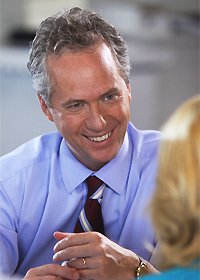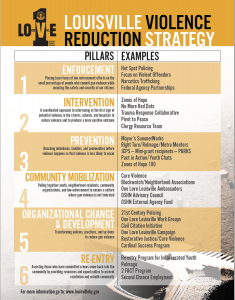 Mayor Greg Fischer and officials with the University of Louisville and Centerstone Kentucky announced today that the city has been awarded a $5 million, five-year federal grant to launch an initiative to promote resilience and equity for Louisville families and young people most affected by trauma, inequity and violence.
Mayor Greg Fischer and officials with the University of Louisville and Centerstone Kentucky announced today that the city has been awarded a $5 million, five-year federal grant to launch an initiative to promote resilience and equity for Louisville families and young people most affected by trauma, inequity and violence.
The Mayor’s Office for Safe and Healthy Neighborhoods will manage the Trauma Resilient Community Initiative, funded by the U.S. Department of Health and Human Services’ Substance Abuse and Mental Health Services Administration, in partnership with U of L’s Kent School of Social Work and Centerstone Kentucky.
The initiative will use a community-based approach to build a “trauma-informed” system of care and services to children and families exposed to violence. The effort is meant to increase the knowledge and skills of people who respond to, make referrals and provide services to youth and families affected by violence, trauma and racial inequity.
“Louisville is a compassionate city, and compassion requires that we work to remove barriers and create opportunities so that every citizen has the ability to reach their full human potential,” Mayor Fischer said. “This initiative is another tool we can use to dismantle the very real barriers of violence, trauma and racial inequity.”
The partners aim to provide trauma treatment to 400 children and their families in west and south Louisville, where data shows that youth and families are disproportionately affected by trauma, violence and systematic inequities. The initiative also involves training 200 clinicians in trauma interventions, and 200 first responders, volunteers and community service providers in a special first-aid approach to youth mental health.
Another 40 service providers, public school officials and leaders will be trained in a trauma-resilient approach through the initiative, which will also share the trauma-care information to 50 community agencies serving youth and families and develop a leadership advisory board to increase awareness of trauma and its effects. The initiative includes evaluation of its consumer impact.
“Our city has made significant gains towards deepening our understanding and ability to make progress against complex challenges like violence and racial inequity. This opportunity allows us to elevate a system that does not just focus on the individual, but organizations, systems, and community as part of the healing process,” said Rashaad Abdur-Rahman, Director of the Office for Safe and Healthy Neighborhoods.
“At Centerstone Kentucky, we are proud to partner with SAMSHA, The Mayor’s Office for Safe and Healthy Neighborhoods and the U of L Kent School of Social Work to provide evidence-based trauma-informed care, creating stronger neighborhoods across our community”, said Dr. Anthony Zipple, President & CEO, Centerstone Kentucky.
“To help people traumatized by violence, it’s so important to use an approach that fully takes into account their circumstances,” said Dr. Jennifer Middleton, associate professor of social work at the Kent School. “The Kent School of Social Work’s researchers are pleased to be partners in this federally funded effort to aid people in ways that are sensitive to their needs and based on proven methods – and to help train members of our community to continue that care.”
For more information, contact Rashaad Abdur-Rahman, Office for Safe and Healthy Neighborhoods, 502-574-2029, or Jennifer Middleton, Kent School of Social Work, 502-852-3651.
 Mayor Greg Fischer is inviting all local faith leaders to sign on to a new online tool designed to better connect faith-based organizations with each other and Louisville Metro Government.
Mayor Greg Fischer is inviting all local faith leaders to sign on to a new online tool designed to better connect faith-based organizations with each other and Louisville Metro Government.
The Mayor’s new Faith Directory also will allow city leaders and staff to communicate information; hear concerns and suggestions; and to establish a list of venues for possible events and programs.
The Mayor will announce the new directory during a press conference at 1 p.m. Tuesday, Aug. 8 at Metro Hall, just before a 1:30 p.m. forum for area faith leaders. All faith leaders are invited to join.
(Sign on to the new directory)
The Mayor said the new directory is an extension of the city’s #BeThe1 efforts to engage citizens, business leaders and faith organizations in ways to help prevent violence in our community.
“Our faith leaders are at the forefront of our compassion efforts in Louisville, and they are important partners in sharing and supporting our long-term violence prevention efforts,” the Mayor said. “This directory will create a more sustainable mechanism for communication. We will use it to keep the leaders and their congregations and constituents apprised of what we’re doing, including faith forums and other events where they can share their advice on what else we can be doing.”
Metro’s Office for Safe and Healthy Neighborhoods is working with the Mayor’s community engagement team and others to establish the directory, which invites faith groups to provide information ranging from their leadership, contact information, available meeting space and location.
Faith leaders can sign on by completing a survey at http://louisvilleky.gov/BeThe1.
For more information or to RVSP for Tuesday’s forum, contact Community Engagement Specialist Althea Jackson at (502) 574-1050, or althea.jackson@louisvilleky.gov.
Louisville’s strategy for reducing violence in part by focusing on high-crime areas is showing progress, including a 13 percent reduction in aggravated assaults, 16 percent reduction in burglaries and 29 percent drop in robberies in those communities.
Speaking to Metro Council, Louisville Metro Police Chief Steve Conrad also cited a 49 percent increase in arrests over the past three months in the neighborhoods where violent crime has been highest, as well as a 50 percent increase in citations issued; and 58 percent increase in self-initiated police activity.
He also noted that police have confiscated 207 guns so far this year — a 38 percent increase over the same period in 2016. Last year, LMPD confiscated 1,778 guns — a 44.7 percent increase over 2015.
While acknowledging there is much work to be done, and the city’s homicide numbers are still troubling, Chief Conrad, Rashaad Abdur-Rahman from the city’s Office for Safe and Healthy Neighborhoods, and Yvette Gentry, Chief of Community Building, told the Council today that there is positive movement in both short and long-term violence-prevention strategies.
They focused their presentation on six pillars of the overall strategy: Enforcement, intervention, prevention, community mobilization, organizational change and development, and re-entry. They also addressed Council questions on spending of public safety funds allocated in December, as part of a mid-year budget adjustment.
LMPD: Overtime is helping
Chief Conrad said that since Nov. 1, LMPD’s newly expanded Narcotics Division has made 244 felony arrests and 59 misdemeanor arrests; and executed 169 searches, uncovering 57 pounds of heroin, 40 pounds of cocaine 73 points of meth and 125 guns.
And the additional funding allocated in December so far has covered 13,709 hours of overtime that allowed for increased patrols in the neighborhoods where violent crime has been most pressing — Park Hill, Russell, Shawnee, Shelby Park, Smoketown and Victory Park.
The Chief said he recently revised the increased patrols to be more strategic about when officers are deployed. “We want to be smart about spending these tax dollars, and mindful not to lean so heavily on overtime that we wear out our officers, who are extremely dedicated to this battle,” the Chief said.
Louisville Metro Police has hired 14 additional officers who are in training now and plans to hire 14 more this summer.
Office for Safe and Healthy Neighborhoods: Creating new pathways
Abdur-Rahman and Gentry said OSHN also is using expanded resources to focus on locations where there are more violent crimes involving youth, and efforts to create pathways away from violence through training, support and educational assistance.
They stressed that OSHN’s charge is long-term, focused on identifying and alleviating many of the root causes of violence, including economic and educational challenges as well as historic, systemic barriers to success for people in the neighborhoods most plagued by violent crime.
But they also pointed to indicators of success, including 100 people who found jobs through Zones of Hope, and 158 young people involved in ReImage, which helps stop the cycle of crime and violence by intervening with youth who’ve been charged with a crime or are at high risk of criminal behavior. Of those 158, 78 have gotten jobs, three have gotten a GED, and 17 have either completed a degree or started college.
OSHN represents a holistic approach in coordinating the efforts of many city agencies and partner organizations, ranging from Metro Parks and Recreation to the Louisville Urban League, Peace Education and Neighborhood House. Through those partnerships, OSHN is engaged with such programs as Zones of Hope, No More Red Dots, Pivot to Peace and, most recently Cure Violence, a cutting-edge method to reduce neighborhood violence by using the same health strategies used to fight infectious diseases. Cure Violence experts from Chicago were in Louisville last week for an assessment visit and training.
Funding for Cure Violence ($83,000) was part of a $625,000 allocation set aside for violence reduction efforts in the budget adjustment. Gentry and Abdur-Rahman outlined spending plans for the rest, including $120,000 to boost OSHN staffing from four full-time staffers to seven, as well as funding for Urban League and Peace Education programs, and 143,000 to external partner agencies for other, smaller programs focused on reducing violence.
“Just as there is no one reason for violence, there is no one solution for alleviating it,” Abdur-Rahman said. “Together, we’re investing in our youth, supporting young people who are trying to change their lives. That, in turn, helps all of us build a safe, more vibrant community.”
 Weather
Weather Traffic
Traffic @LouisvilleDispatch
@LouisvilleDispatch @LouisvilleDisp
@LouisvilleDisp Subscribe
Subscribe